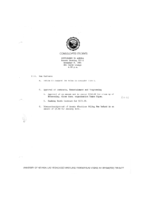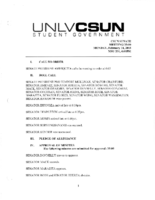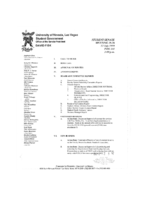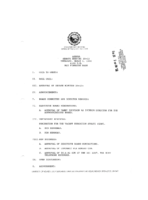Search the Special Collections and Archives Portal
Search Results

Meeting minutes for Consolidated Student Senate University of Nevada, Las Vegas, November 8, 1984
Date
Archival Collection
Description
Text

Meeting minutes for Consolidated Student Senate, University of Nevada, Las Vegas, February 14, 2005
Date
Archival Collection
Description
Text

Meeting minutes for Consolidated Student Senate University of Nevada, Las Vegas, July 12, 1999
Date
Archival Collection
Description
Text

"Hollywood, Westerns and the Mexican Female": manuscript draft by Roosevelt Fitzgerald
Date
Archival Collection
Description
From the Roosevelt Fitzgerald Professional Papers (MS-01082) -- Unpublished manuscripts file.
Text
Walking Box Ranch Photograph Collection
Identifier
Abstract
The Walking Box Ranch Collection (1880-1979, bulk 1930-1945) contains digital images compiled by the University of Nevada, Las Vegas (UNLV) Public Lands Institute. The collection consists of images of the Walking Box Ranch (Searchlight, Nevada), the Mojave Desert, and the Bell Family, consisting of American film stars Rex Bell, Clara Bow, and their children. There are also candid and professional photographs of Rex Bell and Clara Bow taken at various locations, some of which include friends and other family members, as well as a large number of unidentified film stills from Rex Bell movies. Images in this collection are from Bell family photograph albums and assorted prints, and were reformatted into digital images by the UNLV Public Lands Institute.
Archival Collection
Florence Lee Jones and John Cahlan Papers
Identifier
Abstract
The Florence Lee Jones and John Cahlan Papers (1929-1983) contain material created by the couple related to their work at the
Archival Collection

Mariteresa Rivera-Rogers oral history interview: transcript
Date
Archival Collection
Description
Oral history interview with Mariteresa Rivera-Rogers conducted by Maribel Estrada Calderón on October 24, 2018 for the Latinx Voices of Southern Nevada Oral History Project. In this interview, Mariteresa discusses her early life in Concepción, Chile. She talks about her experience moving to Las Vegas, Nevada in 1965, the immigration process at the time, and becoming a Spanish language court interpreter. Rivera-Rogers recalls enrolling at the University of Nevada, Las Vegas' (UNLV) Sam Boyd School of Law, and her involvement with the Latino Bar Association. Lastly, Rivera-Rodgers discusses the challenges in translating Spanish language to English.
Text
Regional subject files, 1859, 1908, 1970-2015
Level of Description
Scope and Contents
The regional subject files include materials collected by anthropologist Katherine Spilde about Native American gaming, Native American communities in the United States, and the US and international gaming industries. The materials date from 1859 to 2015, with the bulk of materials dating from 1990 to 2010. Materials dating from the nineteenth and early twentieth centuries are a reproduction of a federal treaty and an ethnohistorical essay. The majority of the materials document Native American gaming following the passage of the 1988 Indian Gaming Regulatory Act. The papers include research and subject files created by Dr. Spilde during her employment with the National Gambling Impact Study Commission (NGISC), National Indian Gaming Association (NIGA), and Harvard Project on American Indian Economic Development (HPAIED). The materials document Native American gaming enterprises both on and off reservations, the socioeconomic impact of gaming, the political history of gaming in the US, and international gaming. The series includes socioeconomic reports, testimonies, correspondence, memos, press releases, photographs, audiovisual materials, promotional materials, brochures, fact sheets, summaries, booklets, pamphlets, advertisements, tourism materials, journal articles, legal briefs, legislative documents, court opinions, notes, presentations, conference materials, periodicals, community newspapers, and newspaper articles.
The collection contains documentation on a number of Native American nations, including the Misi-zaaga'iganiing Anishinaabeg (Minnesota Chippewa Tribe, Mille Lacs Band); Gaa-waabaabiganikaag Anishinaabeg (Minnesota Chippewa Tribe, White Earth Band); Forest County Bodéwadmi (Forest County Potawatomi Community); Ho-Chunk Nation of Wisconsin; Mashantucket Pequot Indian Tribe; Mohegan Tribe of Indians; Tulalip Tribes of Washington; Sisseton-Wahpeton Oyate of the Lake Traverse Reservation; Standing Rock Sioux Tribe of North and South Dakota; Mandan, Hidatsa, and Sahnish (Arikara) (Three Affiliated Tribes of the Fort Berthold Reservation, North Dakota); and Mississippi Band of Choctaw Indians. Other communities are also represented in the series, but to a lesser extent. In addition to materials about gaming and casinos, Dr. Spilde also collected documents, photographs, and audiovisual materials about Native American culture in general. The series documents regional and national trends in Native American gaming, and the greater gaming industry. Materials trace federal and state relationships with individual Native American nations, specifically concerning gaming enterprises.
Archival Collection
Collection Name: Katherine A. Spilde Papers on Native American Gaming
Box/Folder: N/A
Archival Component

Meeting minutes for Consolidated Student Senate University of Nevada, Las Vegas, March 1, 1990
Date
Archival Collection
Description
Text
John Vellardita (Clark County Education Association) oral history interview conducted by Magdalena Martinez: transcript
Date
Archival Collection
Description
From the Lincy Institute "Perspectives from the COVID-19 Pandemic" Oral History Project (MS-01178) -- Education sector interviews file.
Text
